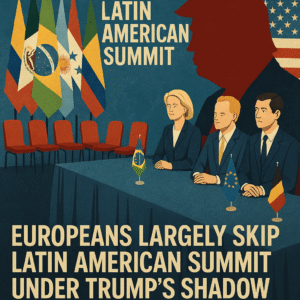
EU Suspends Countermeasures While Trade Talks Continue

The European Union has decided to delay the enforcement of retaliatory tariffs against the United States until August 1, 2025, leaving room for trade talks aimed at defusing escalating tensions. The move holds back two significant packages of countermeasures that were authorized but not yet implemented.
The first package targets approximately €21 billion in U.S. exports, including agricultural goods such as soybeans and poultry, as well as motorcycles, textiles, and aluminum scrap. These tariffs were scheduled to take effect in July. A second, more comprehensive package—covering €72 billion worth of goods, including cars, aircraft, and industrial machinery—is also prepared but awaits approval from member states.
This delay is a strategic pause by the EU, signaling its preference for negotiation over escalation. Commission President Ursula von der Leyen emphasized the importance of finding a political solution while preparing for the possibility of retaliation. Should negotiations fail, the EU has set August 7 as the date for implementing the whole tariff regime.
Meanwhile, the U.S. has threatened to impose 30% tariffs on a broad range of EU imports, citing national security and the need to reduce its trade deficit. These measures, proposed by President Trump, are scheduled to take effect on August 1 unless a bilateral agreement is reached.
Diplomatic sources confirm that talks are ongoing, though no final agreement is in sight. Italy’s Foreign Minister Antonio Tajani acknowledged that avoiding immediate confrontation is prudent, while other member states, such as France, have called for a tougher line. Germany and Italy, on the other hand, prefer to extend negotiations and minimize economic damage.
In the background, Brussels is quietly preparing its Anti-Coercion Instrument—a legal mechanism that would allow the EU to counter economic pressure from third countries. While not yet activated, it remains a possible lever if U.S. tariffs proceed without concessions.
Businesses involved in transatlantic trade are advised to evaluate their supply chains, introduce tariff adjustment clauses in contracts, and monitor exemptions for sensitive sectors, such as pharmaceuticals, wine, and automotive products. With the threat of tariffs looming, the next few weeks are critical for stakeholders on both sides of the Atlantic.
EU Suspends Countermeasures While Trade Talks Continue

Budget Crisis Threatens the Ukraine Special Tribunal Initiative
Budget shortfalls and donor hesitation are putting the Ukraine special tribunal initiative at risk, raising fears that efforts to prosecute Russian aggression could stall.

European Leaders Skip Latin American Summit Amid Trump’s Shadow
Top European leaders skip Latin American summit under Trump’s shadow, leaving the EU-CELAC talks in Colombia with minimal attendance

UK Government to Adjust Planning Overhaul to Boost Growth
he government is refining the UK planning overhaul to stimulate growth by curbing legal delays, limiting council vetoes

Sterling Falls as Slower Wage Growth Fuels Bank of England
The pound weakened after UK data showed slower wage growth, raising expectations of an early Bank of England rate cut




















